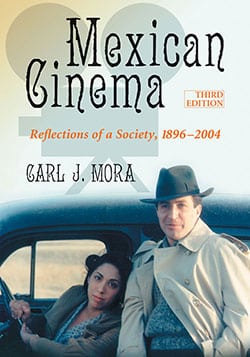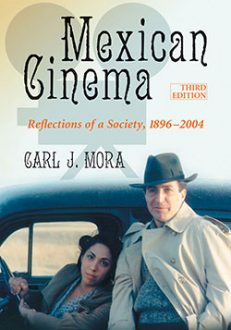Mexican Cinema
Reflections of a Society, 1896–2004, 3d ed.
$29.95
In stock
About the Book
Mexican filmmaking is traced from its early beginnings in 1896 to the present in this book. Of particular interest are the great changes from 1990 to 2004: the confluence of talented and dedicated filmmakers, important changes in Mexican cinematic infrastructure and significant social and cultural transformations. From Nicolás Echevarría’s Cabeza de Vaca (1991), to the 1992 releases of Hellboy director Guillermo del Toro’s Cronos and Alfonso Arau’s Como agua para chocolate, to Alfonso Cuarón’s Y tu mamá también (2001), this work provides a close look at Mexican films that received international commercial success and critical acclaim and put Mexico on the cinematic world map.
Arranged chronologically, this edition (originally published in 2005) covers the entire scope of Mexican cinema. The main films and their directors are discussed, together with the political, social and economic contexts of the times.
About the Author(s)
Bibliographic Details
Carl J. Mora
Format: softcover (7 x 10)
Pages: 335
Bibliographic Info: 158 photos, appendices, notes, bibliography, index
Copyright Date: 2012 [2005]
pISBN: 978-0-7864-6925-3
eISBN: 978-0-7864-9187-2
Imprint: McFarland
Table of Contents
Preface to the Third Edition 1
1. The Silent Film Era: 1896–1929 3
2. The Coming of Sound: 1930–1939 27
3. War and Growth of a Major Industry: 1940–1946 52
4. “Golden Age,” Crisis, and Retrenchment: 1947–1959 75
5. Decline, Renovation, and the Return of Commercialism: 1960–1980 105
6. “To Rebuild a Ruined Cinema in a Ruined Country”: 1981–1989 150
7. Globalization and New Paths: 1990–2004 187
Epilogue 251
Appendix 1. Selected Filmographies 259
Appendix 2. Useful Addresses 264
Notes 267
Bibliography 293
Index 315
Book Reviews & Awards
“recommended”—Choice; “a wonderful book…quite interesting…excellent photos”—The Mexican Film Bulletin.





